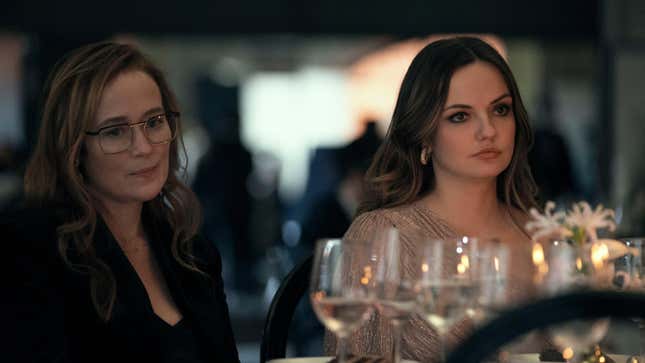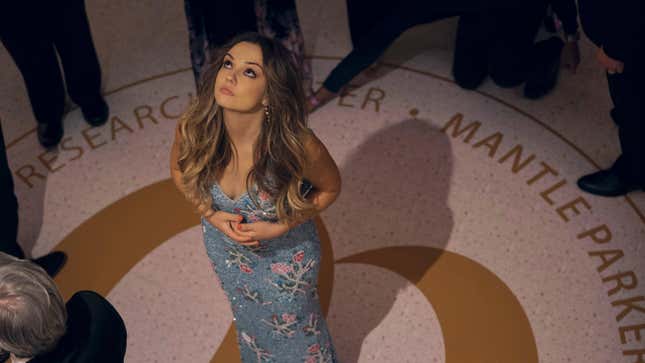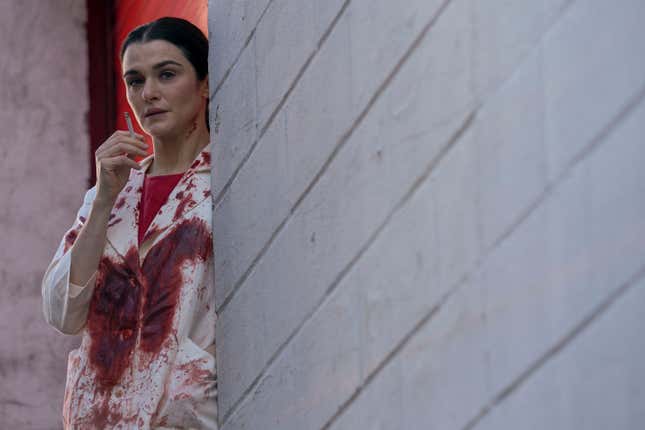‘Dead Ringers’ Skewers the Grim Realties of Gynecological Care
Emily Meade—in her first role since making noise about intimacy coordinators in 2018—spoke to Jezebel about the unsettling nature of the Prime Video series.
EntertainmentTV

In the premiere episode of Prime Video’s new mini-series Dead Ringers, Rachel Weisz, as twin gynecologists Elliot and Beverly Mantle, goes head(s) to head with Rebecca Parker (Jennifer Ehle), a billionaire drug-company heiress of the Sackler sort. The Mantles have pitched her an idea for a revolutionary birthing center and laboratory as an alternative to hospitals in which giving birth too often results in death. They could change the way people bear children, if only with her investment of $16 million.
Medicine, Parker assures the twins, is her “fucking jam,” but she’s less than compelled by their pitch, leaving one with the impression that the notion of all pregnant people being provided with the dignity of resources and attention…well, isn’t her jam at all. Beverly, the more altruistic of the twins, responds with an affecting diatribe about the “diabolical” medical industrial complex and how it maims the lives of patients and their babies every day: “It’s a system that bullies and scares and terrorizes and humiliates and rushes and ruins women and their bodies,” she says across a pristine table linen in a pretentious Manhattan eatery. Suddenly, Parker’s interest is piqued.
Dead Ringers, which premieres on Friday, is subversive, sometimes shockingly gory, and a needful skewering of the U.S. medical system, the unethically wealthy, and perhaps most of all, the women society lauds as the arbiters of feminism. Among its most ghastly features is the ensemble cast of complex women who hold (and exploit) power throughout. A feminized take on David Cronenberg’s film of the same name, the six-episode series interrogates their internalized misogyny and capitalistic desires as the twisted twins chase their all-consuming dreams: For Beverly, it’s actualizing worldwide bodily autonomy for women, while Elliot seems only to be motivated by experimentation (like illegally growing embryos in a lab).

One character’s intentions are slightly more ambiguous: Susan, Parker’s baby-loving fourth wife, who upon introduction seems to be the idealist counterbalance to Parker’s ruthless capitalism. But a more cynical person will swiftly glean she is simply shopping for another wealthy-white-woman busy box to boost her self-esteem and buff her veneer of goodwill. Actor Emily Meade plays her with a certain off-kilter familiarity—like a person you have a perfectly nice conversation with at a cocktail party yet who remains something of an enigma.
“I’m always fascinated by people who seem to have a completely compartmentalized conscious and subconscious,” Meade explained of Susan during a recent Zoom interview with Jezebel. “There’s almost like this facade that they’ve really created for themselves and believe, and then there’s these little moments where the inner person who’s a lot smarter and a lot more manipulative and a lot more aware peeks through in these frightening ways.”
“Susan, of course, is driven by many selfish things; by money, by a desire to immortalize herself in the world by making an impact,” she continued. “I also think that she does believe that she just loves babies and wants to bring them into the world. But I think her intentions are unclear to us as the audience because they’re unclear to her.”
Meade is far more discerning. Her credits are pockmarked by highly-regarded prestige television, like HBO’s Boardwalk Empire, The Leftovers, and most recently, The Deuce, in which she starred as a beleaguered sex-worker-turned-porn-star. But there was at least a two-year period after The Deuce wrapped in 2019 when she readily admits to feeling, as she wrote in a since-deleted Instagram post in 2021, “blacklisted” by the industry. That was, until she landed her role on the almost entirely woman-helmed Dead Ringers.“I think feeling surrounded by women—and not just women, but incredibly kind, special, intelligent women— created a really safe, warm environment, as much as we were acting out and talking about pretty harsh and ugly things at times,” Meade said. “Rachel Weisz is like, the most warm, compassionate human I’ve ever met, so there was just a warmth and a love and sort of feeling of sisterhood or a coven that for me didn’t particularly make anything seem difficult.”
It’s something of a departure for Meade, whose experiences on sets have more often than not been less than positive, since she began acting at 16 years old. She’d been typecast, it seemed, as hyper-sexualized—and hyper-traumatized—characters. Given previous overexposure, she nearly turned down The Deuce, which also happened to see her character either in various states of undress, under duress, or both. But it was too good of an opportunity. “This is the last time,” she recalled telling herself. Meade wouldn’t learn until production began exactly what her role entailed: in short, more nudity, more sexual abuse, and the kind of tragic end the bible says befits all women who dare to have sex for money.
-

-

-

-

-

-

-

-

-

-

-

-

-

-

-

-

-

-

-

-

-

-

-

-

-

-

-

-

-

-

-

-

-

-

-

-

-

-

-

-









































